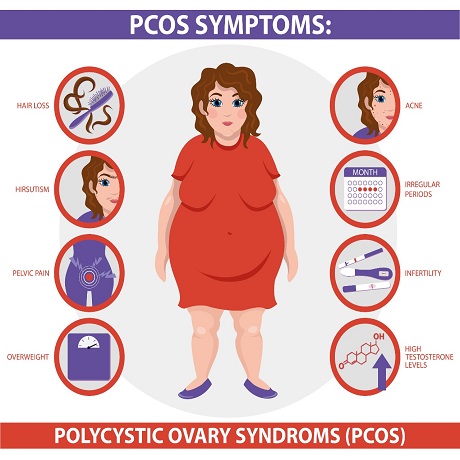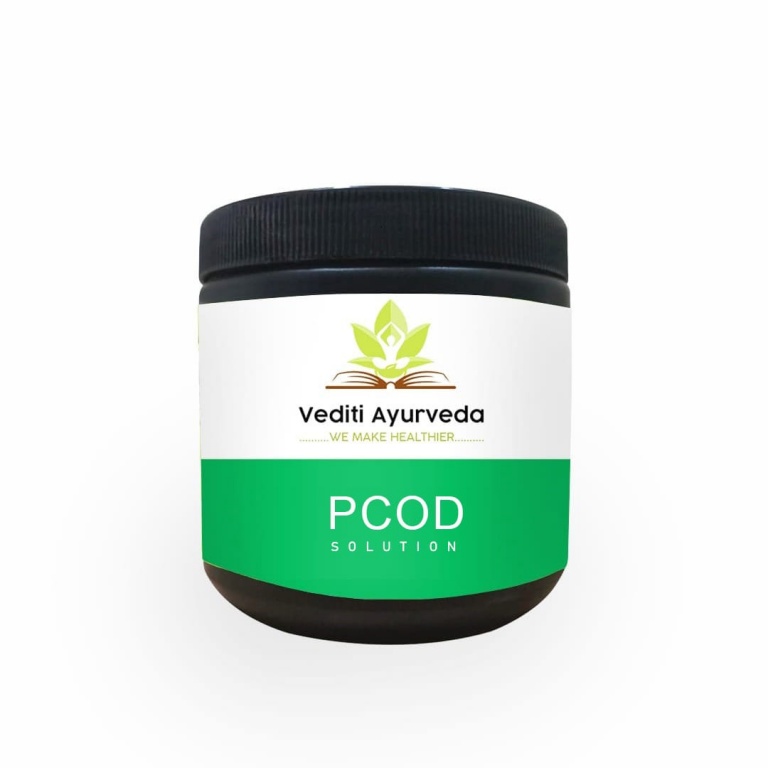WHAT IS PCOD?
In PCOD, small lumps or multiple cysts are formed in the ovaries due to hormonal imbalance. Due to which the amount of male hormone starts increasing in the body, which leads to acne and facial hair start growing. Due to this problem, girls have to face irregular periods and many health problems.Vediti ayurveda facilities best pcod treatment.

SYMPTOMS OF PCOD :
Signs and symptoms of PCOS vary. A diagnosis of PCOS is made when you experience at least two of these signs:
- Irregular periods. Infrequent, irregular or prolonged menstrual cycles are the most common sign of PCOS. For example, you might have fewer than nine periods a year, more than 35 days between periods and abnormally heavy periods.
- Excess androgen. Elevated levels of male hormones may result in physical signs, such as excess facial and body hair (hirsutism), and occasionally severe acne and male-pattern baldness.
- Polycystic ovaries. Your ovaries might be enlarged and contain follicles that surround the eggs. As a result, the ovaries might fail to function regularly.
PCOS signs and symptoms are typically more severe if you’re obese.
COMMON SYMPTOMS OF PCOD/PCOS INCLUDE:
- Acne
- Problems with Weight Loss and Weight Gain
- Hair Growth. In general, women have thicker, darker facial hair and more body hair on their chests, bellies, and backs.
- Scalp hair may also be thin.
- An irregular period. Women with PCOS and PCOD problems rarely have periods. In some cases, women do not have periods or they bleed excessively.
- infertility
- Depression
SYMPTOMS
Signs and symptoms of PCOS vary. A diagnosis of PCOS is made when you experience at least two of these signs:
- Irregular periods. Infrequent, irregular or prolonged menstrual cycles are the most common sign of PCOS. For example, you might have fewer than nine periods a year, more than 35 days between periods and abnormally heavy periods.
- Excess androgen. Elevated levels of male hormones may result in physical signs, such as excess facial and body hair (hirsutism), and occasionally severe acne and male-pattern baldness.
- Polycystic ovaries. Your ovaries might be enlarged and contain follicles that surround the eggs. As a result, the ovaries might fail to function regularly.
PCOS signs and symptoms are typically more severe if you’re obese.
COMMON SYMPTOMS OF PCOD/PCOS INCLUDE:
- Acne
- Problems with Weight Loss and Weight Gain
- Hair Growth. In general, women have thicker, darker facial hair and more body hair on their chests, bellies, and backs.
- Scalp hair may also be thin.
- An irregular period. Women with PCOS and PCOD problems rarely have periods. In some cases, women do not have periods or they bleed excessively.
- infertility
- Depression

HOW DO PCOS VS. PCOD DIFFER?
- PCOS is a severe condition- A healthy diet and regular exercise routine can improve PCOD and prevent it from becoming a disease. It is a metabolic disorder.
- PCOD is on the rise – It affects approximately one-third of all women worldwide. PCOS has fewer patients.
- Complications of PCOS are severe – Women with PCOS are at risk for diabetes, high blood pressure, cardiovascular issues, obesity, and even endometrial cancer.
- PCOS can develop in childhood – Teenage girls are most likely to be diagnosed with it. A metabolic disturbance can lead to acne, excessive hair growth, and weight gain from a young age.
- PCOD does not seem to affect reproductive health significantly –It does not interfere with their ability to conceive. PCOS, on the other hand, affects infertility in women. They even have a higher rate of miscarriage.
- PCOD sufferers can still ovulate regularly –PCOS sufferers do not ovulate due to a severe hormonal imbalance.

TYPES OF PCOS:
This section covers the different types of PCOS and how to determine what type of PCOS you have. PCOS falls into four types:
- Insulin-resistant PCOS,
- Inflammatory PCOS,
- Hidden-cause PCOS,
- And Pill-induced PCOS
TYPES OF PCOS:
This section covers the different types of PCOS and how to determine what type of PCOS you have. PCOS falls into four types:
- Insulin-resistant PCOS,
- Inflammatory PCOS,
- Hidden-cause PCOS,
- And Pill-induced PCOS
Causes of PCOS:
However, some significant factors appear to influence PCOD in women:
- Overproduction of insulin: Excessive insulin levels in the body can increase androgen production (a male hormone), resulting in difficulties ovulating.
- Excessive androgen production: This produces acne and hirsutism as a consequence.
- Inflammation of low grade: Research suggests that women with PCOS experience low-grade inflammation that increases androgen levels, leading to blood vessel disease and heart disease.
- Heredity: PCOS women exhibit specific genetic characteristics.

VEDITI AYURVEDA PCOD TREATMENT
The following are the points you can use to heal your body and overcome the PCOD problem. Positive energy and enthusiasm can aid in your recovery.
- A proper PCOD diet
- Exercise/meditation/yoga
- Proper medication
WHY VEDITI AYURVEDA IS BEST PCOD TREATMENT ?
In India, Vediti Ayurveda PCOD treatment is one of the best treatments for PCOD/PCOS. Thousands of female patients have already received this Ayurvedic treatment for pcod. Vediti’s ingredients in the treatment are natural and herbal. Kanchanar Guggulu and PCOD care are PCOD medicines.
PCOD Care contains herbs such as kachnar Chahal, Ashok Chahal, and giloy, which help you overcome irregular periods. Kanchanar Guggulu relieves pregnancy-related issues.






